And a call for help – please read on for details…
updated below on 2.28.19 to further discuss my discoveries & experiences since the heart attack…
Also… a followup post created on March 8 details my continued progress HERE.
The video below pretty well brings you up to date with me and my RV life, as well as explaining my most unwelcome event a few days ago – a heart attack. I will however fill you in on more details and insights (things I’ve learned) below the video. I also have a “late winter RV life” update posted below.
As I mentioned in the video, I’m a very independent person. In fact, I made it a point to be financially independent since I was about 14 due to family circumstances. At this time however, with a massive deductible on my health insurance ($10,500.), I’m reaching out to my friends, readers, and fellow rv’ers to say, if you can help, any help is appreciated. Here is the LINK to the go-fund-me page.
What I learned about my heart and heart attacks
It started on Tuesday morning Feb 12th and was unfortunately accompanied by a setback in the head and chest cold I’d been fighting for weeks. This has been a rough winter for upper respiratory infections, and it played a role in my thinking that morning. I had a fairly restless night as the chest cold settled back in, but as there was no fever, I decided to head to the mountain to meet my returning students from the prior day’s lesson.
As I ran to catch a bus, I felt a tightness and strange hollow coldness in my sternum – and even wondered if the chest cold had evolved into pneumonia. A later chest x-ray revealed my lungs to be clear. I continued on my normal routine, arrived at the mountain, got dressed into my uniform and rode the “AV” lift to take an early run before meeting my students.
It was on that ski run where the discomfort intensified – I would not call it pain, I’d call it more of an unfamiliar feeling that I’d never experienced prior – and that is what confused me and caused me to ALMOST stay and work a normal day on the ski hill. I checked in at ski school and was on the fence about whether to work the day, but ultimately decided the sensations were foreign enough to warrant a trip to the local “urgent care” office.
I MUST emphasize… had I chosen to ignore the symptoms, as nebulous as they were, what ended up being a moderate heart attack (my troponin levels exceeded 27) – and the small irregularities in left ventricle of my heart COULD have resulted in a MASSIVE heart attack and SUDDEN CARDIAC DEATH.
“If you feel something you’ve never felt before – and it doesn’t feel right… DO NOT ignore it. SEEK IMMEDIATE MEDICAL ATTENTION – it may be your LAST (and only) chance.”
My words above seem to have resonated with several folks and I truly hope and pray help someone who finds themselves in similar circumstances.
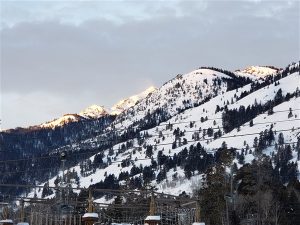
Entering our Medical Care System
This was my first serious medical incident in my life – and I must say, the level of medical care I received was outstanding – at each step in the process. I drove to the urgent care in town, about 20 minutes from the mountain and presented myself to the attendant at the reception window. The moment I mentioned chest pain/discomfort, she immediately checked me in and got me a P.A. to check me out.
Two back to back EKG’s revealed an abnormal heart rhythm – far enough off to warrant a trip by ambulance to the ER in town (Jackson, Wy) where they drew blood. They found troponin, which I learned is a molecule that only appears in the blood during a heart attack. The levels were significant enough for the ER nurse to insist I remain in bed and relaxed as they prepared to transport me to a regional medical center in Idaho Falls, about 2 hours away. During my stay at the hospital in Jackson, within 90 minutes of the first abnormal EKGs, my EKG returned to normal. I learned that an EKG is truly only a valuable tool DURING a cardiac event, and not really before or after.
Upon arrival at the regional medical center, within minutes I was transported to the cardiac unit, hooked up to all kinds of IV and monitors and visited by a cardiologist who assessed my condition and determined the following day I was to receive a catheter procedure with the idea I may need a stent or two in my arteries (stents are inserted into the arterys on the outside of the heart where blockage is found and immediately restore bloodflow to the affected area – I ended up needing two.) Meanwhile, my troponin levels continued to rise (even though the “cardiac event” had apparently ceased – I had no further discomfort), the levels of this molecule will rise for another day or so and reveal the severity of the heart attack.
Interestingly, they did extensive blood work and my results, along with blood pressure, were not far “off the mark.” That is, if I were to have come in the day prior and had blood work done, while my readings were not ideal, they were not off the chart poor and a doctor would likely have made some recommendations but not presented my blood profile as a disaster waiting to happen.
The catheter procedure was preformed after an echo cardiogram was ordered. The echo looks for heart muscle and valve damage – mine was found to be minimal with likely a full recovery. This despite triponin levels that rose to the “moderate” category.
Wednesday evening I was transported to the catheter lab for the procedure. This was just 24 hours after being admitted to the hospital in Idaho. Since my “event” was not a massive heart attack (it WAS rated as “moderate” by the troponin levels), the cardiologist put more urgent cases ahead of me. It also gave my body time to recovery from the initial shock of the entire experience.
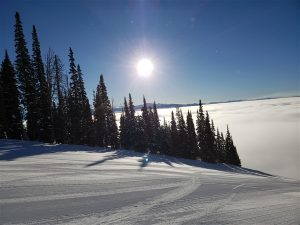
The catheter – stent procedure
The doctor runs something that looks like fishing line through an artery in your wrist and directly up to the heart. He injects a dye that allows him to easily identify blockages. They numb your wrist and you’re awake and lucid through the entire procedure. The doctor identified a need in me for 2 stents which also travel via the hollow fishing line to the arteries in need. An hour and a quarter later, I was back in my room – and able to walk (to the bathroom as needed) and was released the following morning!
Immediately after the procedure and my full blood flow was restored – likely for the first time in a couple of years – I felt MUCH better and… I’m even cleared to start skiing and ski teaching tomorrow, just 1 week after the “event!”
I should also emphasize at NO time was I “short of breath”, experiencing pain to a high level in the chest or anything other than “normal” to those who know me on the ski hill DURING the time when I was experiencing the heart attack. It is kind of scary that the symptoms are not more clear cut as I truly debated whether to even seek medical assistance – and had I chosen not to, the outcome could have been VERY different.
Hey, thanks for allowing me to share this. I hope it may serve to help others should they find themselves in a similar situation. As I noted earlier, I have a BIG deductible to take care of and if you are moved to (and able to) assist – please click HERE.
Lastly, if I have stated anything that is medically or scientifically inaccurate, I welcome your feedback and corrections.
Two weeks after my heart attack…
As the doctor promised, I returned to the ski slopes JUST ONE WEEK after my heart attack. I limited myself to teaching on “green” (novice) terrain for the first 3 days I was back on the slopes. My lessons typically run all day, so, I’m skiing (and teaching) nearly 5 hours each day. On the 4th day, I moved to advanced terrain and advanced learners (even the blue terrain at Jackson Hole is advanced!) After 8 straight days, I took a break (a well deserved break!)
Today is Feb 28, I stayed off snow (we’re having typical late season “slop” as a mix of heavy snow and temperatures well above freezing.) I took the day to visit with a cardiac rehab doctor here in Jackson who checked my blood pressure (106/62) and ran a stress ekg, and all showed fine. The doctor gave me some helpful tips on eating and exercising and I proceeded to head to the local gym to do a light cardio workout and then roast in the sauna and relax in the hot tub.
My low blood pressure is due to one of the meds the cardiologist has me on – its intent in my case is not to lower my blood pressure, but to help strengthen the pumping action of my left ventrical which is SLIGHTLY weak (emphasis on slightly.) This medicine – carvedilol (coreg) – is apparently quite effective at helping the heart muscle recover from the shock of a heart attack.
Well… all for now, I will continue to update you on events as things progress. I did include a brief update below as well on the late winter conditions here in the Jackson region.
Late Winter RV Life Update
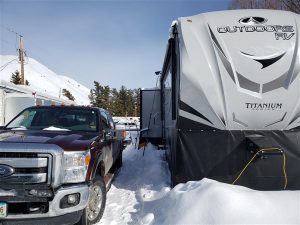
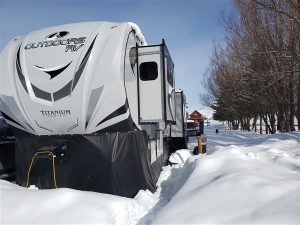
The snow is about at its maximum depth. Its Feb. 18 and with an increasingly stronger sun each day, more melting than new snow is likely. The camper has held up well. I’ve had roughly monthly propane refills (about $150/month) and my electric bills are hovering in the $55. range. I run the fridge on electric EXCEPT when temperatures are expected to drop below 0F at night. On those nights (and all day in January), I run it on propane to keep it from failing (see my other posts on winter rv camping tips for success.) I also have a light bulb ready to run inside the back-side of the fridge for extreme cold (below -10F.) We’ve had a few nights like that, in fact this morning was -17F!
In a few days, I’m going to remove the light bulb and tape that is blocking 2 of the 3 vents (NOT ADVISED) behind the fridge – this is to prevent fire from over heating as the temperature begins to rise and the sun gets stronger. My camper is oriented so it gets morning sun on the side with the fridge – and now the sun hits it shortly after 8am.
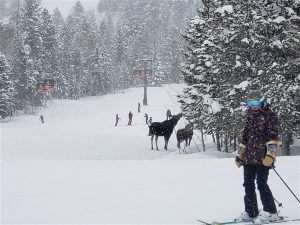
I have been on the roof just two times to remove snow. One thing I’ve noticed about my Glacier Peak is there is little heat loss from the interior of the camper through the roof (or slide roofs) compared to my neighbors campers. The end result? They don’t have to shovel as much, but their heating bills are likely much higher!
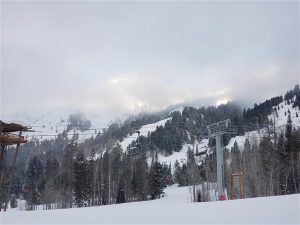
From all appearances, NO leaks, NO roof damage, and NO other issues with my camper (knock wood!) Its hard to believe that March is in just 10 days – and from there, things change dramatically and rapidly. The snow pack will begin to fade away, I will slowly break down my winter preparations – eventually even the skirting will go and the propane tank will return to Ferrell Gas (who has done an outstanding job this year!) As I mentioned in my video, I will be posting in the coming weeks a summary of my travels across Washington & Oregon last Autumn – with details on where to stay and what it costs.
Feb 28 – Fascinating changes here in Jackson over the past 10 days…
About a week ago, I was thrilled to have to start the truck in -17F conditions. Considering it was mid-late February, my excitement for these temperatures is dwindling (quickly!) From that morning, over the past few days, the temperature rose (and rose and rose.) What started out as a prolonged dry snowstorm (the mountain received about 40 inches of dry powder) has now (since 2/26) turned into a “slop-fest” – temperatures here in the valley crossed above freezing (with snow continuing to fall) on Feb 26 and today, its now 37 (probably heading to 40F) before all is said and done.
An additional 20 – 40 inches of snow has fallen on the mountain since the temperatures rose – but – while it has accumulated on the mountain, the wet/sticky snow “line” has risen to about 8000 ft., and here in the valley (at about 6000 ft), most of that snow is just piles of melting slush. The roads alternate between just wet & thick slush. Aaaah, the change of seasons is here!
A few days ago, we had 3-4 feet of snow on the ground HERE IN THE VALLEY, now it has both melted and consolidated. One consequence of this is the fact that avalanche danger is nearly off the charts. Back-country skiing has been closed off for the past couple of days as a result.
I have blocks of snow falling off the roof of the camper (I’m trying to NOT have to climb on the camper to address this) and so far nature is cooperating – this stuff is melting quickly. A little sunshine at this time of year also goes a long way. And… if this keeps up, soon, MUD will be the big issue as the ground will be saturated for a short time as it thaws.
In closing, THANKS for reading and if you chose to help me via the go fund me, thank you literally from the bottom of my now recovering HEART!
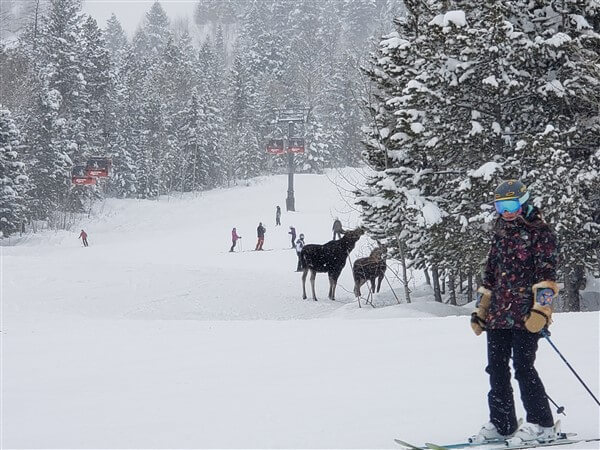
It has been a harsh winter for head and chest colds. I’m happy you chosen to take this genuine. I’m truly dazzled with how well your RV is taking care of the winter climate. Much obliged to you for aiding such a significant number of others with the important data you give on your page and channel.
Thanks Bonnie, and yeah, it was a rough winter. Al
Dean Ornish has a great heart health program and it is covered by some ins. and medicare. He also has a book . go to his website and check it out.
Thanks Kathy, I will definitely check it out. Al
Thank You for sharing your speedy recovery and health tips!
All the Best!
Lou
Thanks Lou, its up to each of us to listen to our bodies – those who do not, may pay the ultimate price. Al
HEADING WEST !!! YOU’LL ENJOY THE DRIVE. I ALWAYS DO. IF YOU COME THRU NORTHERN NEVADA GIMME A CALL WE’LL GET A LUNCH
Peewee,
I’m IN Jackson, Wy. Not heading anywhere at the moment. Thanks for the offer though.
Al
Good to see your on the mend and doing well, Al. I was wondering how you winter was progressing this year. Looks like things are holding up great. Be safe, hear from you soon.
Thanks Ken
What a shock! You seem to have such a very healthy lifestyle so, I’m sure this was one of the furthest things from your mind. Thank heavens you thought to go in. I likely would not have myself.
Likely your overall good health is what’s allowing you to recover much more quickly than many would so, here’s to continued achievement of better health than you even had before!
Thanks Melissa. I hit advanced ski trails today and felt great! Al
Alan, thank you for sharing your experience. I’m praying for you to continue to improve. It has been a rough winter for head and chest colds. I’m glad you decided to take this serious. I’m really impressed with how well your RV is handling the winter weather. Thank you for helping so many others with the valuable information you provide on your page and channel. Please take care of yourself and God Bless!😊
Tia
Tia,
Thanks so much! By the way, if all works out, I’ll be back in Casper this summer – at a new store (does not yet exist!) Al
Hi Al!
So relieved to know you are alright and your healing has already begun. I think you said 10 more days until March and the thaw/melt will begin. That translates Al to NO More Shoveling until next winter!!! ; )
Please give yourself time. Enjoy skiing,teaching and the beauty our Universe gives us.
Sincerely,
Your friend and fan,
Linda Gillespie
yep Linda, I’m going to do my best to avoid shoveling… but, actually, with the stents, blood flow in my heart has been restored to 100% so realistically, it should not be an impairment to shovel snow. Al
Thank you for sharing your story, and all that information. I am so glad you are okay, and back home. Keeping you in prayer. Looking forward to your post about your trip to Washington and Oregon.
thanks! I’ve started working on it, but its going to take some time. Al
THANK YOU for sharing … after several years in a primary clinic with hospital just across the street, I found your story VERY TRUE for many MI patients. “It’s not like I thought it would be,” is a typical comment. Too, you describe the procedures & reasoning well.
I really enjoy your blog and wish you the best recovery!
Thanks. I’m glad to hear that I have an understanding of it. Tomorrow will be my 1st day back on skis – just 1 week after the event. Al